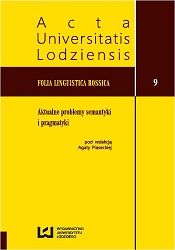ПАРАДИГМАТИЧЕСКАЯ МОДЕЛЬ С ДОМИНАНТОЙ РАДОСТЬ – ГОРЕ (НА МАТЕРИАЛЕ СОЧИНЕНИЙ А. П. ЧЕХОВА И СЛОВАРЕЙ РУССКОГО ЯЗЫКА)
THE PARADIGM WITH THE DOMINANT OF RADOST’ – GORIE (ON THE MATERIAL OF A. TCHEKHOV’S LITERARY TEXTS AND RUSSIAN LANGUAGE DICTIONARIES)
Author(s): Jaroslaw WierzbińskiSubject(s): Language and Literature Studies
Published by: Wydawnictwo Uniwersytetu Łódzkiego
Summary/Abstract: The present paper considers the antonymous and synonymous relations that can be observed in the literary texts of A. Tchekhov with regard to the paradigm with the dominant of radostʼ – gorie. In the paradigm in question the first lexeme appears in antonymous relations with the other 11 lexical units: skorbʼ, grustʼ, pechalʼ, muka, stradanije, bolʼ, skuka, toska, dosada, otchajanie, uzhas. The units quoted above are synonymously connected, even though they refer to different synonymous groups. Such determined the synonymy demands a description of differences between the opposites. The differences can be more emphasized as a result of seme analysis that aims at relating semes to particular units in the paradigm. The antonymous and synonymous connections presented in the paper can be recognized as a specific kind of the writer’s speech since to a considerable degree they shape the Tchekhov’s style.
Journal: Acta Universitatis Lodziensis. Folia Linguistica Rossica
- Issue Year: 2013
- Issue No: 9
- Page Range: 127-140
- Page Count: 14
- Language: Russian

